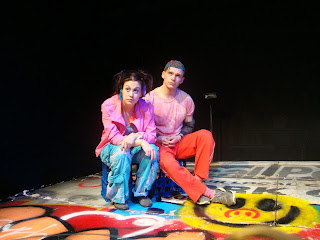Enda Walsh
Directed by Anna Simpson
★★★
Pros: The tender moments were beautifully performed with the actors really matching each other on stage.
Cons: The fast pace of the show and the quick delivery of lines in Irish accents made it difficult to understand what was going on in places.
Our Verdict: The combination of quirky aspects and sensitive moments make this production very special, but while it hits the mark perfectly in certain places, some potentially excellent moments are lost.
 |
| Credit: Graham Burke |
Enda Walsh’s 1997 play Disco Pigs revolves around the dramatic relationship between Pig and Runt, real names Darren and Sinead, as they live in their own dangerous world. As the teenagers turn 17, Pig struggles to balance his violent tendencies towards everyone outside their bubble with his sexual feelings towards Runt, who is meanwhile discovering that there is more to life than that which she has created with Pig.
Max Dorey’s simple set, a raised platform which all the action takes place upon, was overflowing with graffiti of recognisable 1990s insignia such as the smiling yellow face. This, along with an excellent sound design that mixed popular tunes from the same era, and the well thought out costumes of both actors, worked really well as visual stimuli for the audience, placing them in a really specific time and place.
Lorna Jinks and Edmund Digby-Jones portrayed the relationship between Runt and Pig delicately, the symbolic waves of power passing across from actor to actor effectively. It was a very realistic representation of both personalities; the actors ensure that the audience understands the characters’ struggles as they grow from children into adults, dealing not just with normal teenage issues but also with Pig’s unbalanced personality.
Enda Walsh’s use of language reminded me of Anthony Burgess’ experimentation with the English language in A Clockwork Orange. It was a simplified 1990s dialect, but it really contributed towards the feel of the performance, amplifying the relationship between the characters and the rest of society, and the insular world they had created as Pig and Runt. Unfortunately, it was also the reason I sometimes found the story difficult to follow.
The play is fast-paced and slightly surreal, but it is also a somewhat believable portrayal of injured teenagers. The piece calls for strong performances, and while Jinks and Digby-Jones were both impressive physically, the mix of the Irish accents, the speed of the dialogue and the use of vernacular language caused both myself and my companion to lose track of what was happening in places, often picking it up again a number of lines later. Language is so important in theatre; it cannot be ignored, and addressing this singular weakness would allow the audience to follow the story throughout and make the performance an interesting and poignant period piece. Unfortunately, the emotions were a little lost on me during the moments in which I couldn’t understand what was being said.
So overall another positive experience at the Tristan Bates. Blue Crate Theatre’s debut has plenty of positives and some strong performance moments, but as always there are areas that require some work. Another young company to keep an eye on though!
Please feel free to leave your thoughts and comments in the section below!
Disco Pigs runs at the Tristan Bates Theatre until 8th September 2012.
Box Office: 020 7240 6283 or book online at http://www.tristanbatestheatre.co.uk/production_details_discopigs.asp
 Everything Theatre Reviews, interviews and news for theatre lovers, London and beyond
Everything Theatre Reviews, interviews and news for theatre lovers, London and beyond



“Language is so important in theatre”
Their language is a mix of made-up phrases, street patois, Cork colloquialisms and half-formed sentences because of their inability to articulate precisely what they feel, which is the result of all their experiences. Language, even in the theatre, is second to intent. There are intentions, attitudes and atmospheres created in the dialogue that are much more powerful than coherent sentences could muster for them. Actually, in the case of ‘Disco Pigs’ I think it would detract.
I think her point is that you couldn’t make out what ‘made-up phrases, street patois, Cork colloquialisms and half-formed sentences’ they were saying. Not that it was difficult to get to grips with the dialogue, but it was difficult to make out the dialogue. As an audience member, I left wanting to buy the script as I hadn’t heard much of it.
Maybe it’s because I have Irish family from Cork, but I didn’t find it a struggle to understand them at all. I loved the show, it was amazing. The play has to be as high tempo as it was, I actually feel it could possibly be even more manic. The bigger the action is, the more the slow poignant scenes stick out. Loved the beach scene.
Thank you all so much for your comments :)! Great to get a bit of debate going!